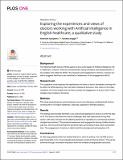Files in this item
Exploring the experiences and views of doctors working with Artificial Intelligence in English healthcare : a qualitative study
Item metadata
| dc.contributor.author | Ganapathi, Shaswath | |
| dc.contributor.author | Duggal, Sandhya | |
| dc.date.accessioned | 2023-05-11T13:30:04Z | |
| dc.date.available | 2023-05-11T13:30:04Z | |
| dc.date.issued | 2023-03-02 | |
| dc.identifier | 285749945 | |
| dc.identifier | 6359e4d1-1b7d-42dd-b548-d0c9190f1b4c | |
| dc.identifier | 85149273670 | |
| dc.identifier.citation | Ganapathi , S & Duggal , S 2023 , ' Exploring the experiences and views of doctors working with Artificial Intelligence in English healthcare : a qualitative study ' , PLoS ONE , vol. 18 , no. 3 , e0282415 . https://doi.org/10.1371/journal.pone.0282415 | en |
| dc.identifier.issn | 1932-6203 | |
| dc.identifier.other | ORCID: /0000-0003-4477-7623/work/135018870 | |
| dc.identifier.uri | https://hdl.handle.net/10023/27575 | |
| dc.description.abstract | Background The National Health Service (NHS) aspires to be a world leader of Artificial Intelligence (AI) in healthcare, however, there are several barriers facing translation and implementation. A key enabler of AI within the NHS is the education and engagement of doctors, however evidence suggests that there is an overall lack of awareness of and engagement with AI. Research aim This qualitative study explores the experiences and views of doctor developers working with AI within the NHS exploring; their role within medical AI discourse, their views on the implementation of AI more widely and how they consider the engagement of doctors with AI technologies may increase in the future. Methods This study involved eleven semi-structured, one-to-one interviews conducted with doctors working with AI in English healthcare. Data was subjected to thematic analysis. Results The findings demonstrate that there is an unstructured pathway for doctors to enter the field of AI. The doctors described the various challenges they had experienced during their career, with many arising from the differing demands of operating in a commercial and technological environment. The perceived awareness and engagement among frontline doctors was low, with two prominent barriers being the hype surrounding AI and a lack of protected time. The engagement of doctors is vital for both the development and adoption of AI. Conclusions AI offers big potential within the medical field but is still in its infancy. For the NHS to leverage the benefits of AI, it must educate and empower current and future doctors. This can be achieved through; informative education within the medical undergraduate curriculum, protecting time for current doctors to develop understanding and providing flexible opportunities for NHS doctors to explore this field. | |
| dc.format.extent | 17 | |
| dc.format.extent | 461344 | |
| dc.language.iso | eng | |
| dc.relation.ispartof | PLoS ONE | en |
| dc.subject | R Medicine (General) | en |
| dc.subject | E-DAS | en |
| dc.subject | MCC | en |
| dc.subject.lcc | R1 | en |
| dc.title | Exploring the experiences and views of doctors working with Artificial Intelligence in English healthcare : a qualitative study | en |
| dc.type | Journal article | en |
| dc.contributor.institution | University of St Andrews. School of Medicine | en |
| dc.identifier.doi | 10.1371/journal.pone.0282415 | |
| dc.description.status | Peer reviewed | en |
This item appears in the following Collection(s)
Items in the St Andrews Research Repository are protected by copyright, with all rights reserved, unless otherwise indicated.

